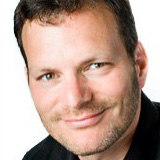
Lou Rosenfeld is a globetrotting Internet celebrity, a consultant and speaker perhaps best known as co-author of the book considered to have defined the field of information architecture.
He’s also one of our dear friends, so it didn’t surprise me when he opened our interview about redefining his career with a reference to Bob Dylan.
Lou asked if I’d seen Don’t Look Back, the 1967 documentary on folk legend. Lou said he loved Don’t Look Back because, despite his young age, Dylan is so undeterred by the opinion of others. He’s on his own path and if it offends folk fans when he goes electric, for example, so be it.
What’s that got to do with being a technology entrepreneur who founded Rosenfeld Media, a publishing company focused on user experience design?
Lou hypothesizes that part of what’s made him successful is an ability to generate excitement for new ideas, and to do that, he says, he has to have a certain immunity to the opinion of others.
“If you get distracted from what’s fun and enjoyable, and you’re too concerned with what people think you should do, you won’t be as interesting, and you’ll lose that ability to create excitement,” he said.
During a long, wonderfully meandering conversation over dessert, I asked Lou about three pivotal points in his career: getting into technology initially, shuttering his consulting firm in the dot-com bust, and starting his publishing company.
The early days of the Internet
Lou grew up watching his dad enjoy being a business owner — he founded a furniture rental company — so Lou had an inkling even as a college undergrad that he might like to start a business. He just didn’t know what he’d do.
These being the days before the Internet explosion — before online real estate listings and Craigslist — Lou thought he might create a database of student apartments in Ann Arbor, where he was going to school at University of Michigan. He knew he wanted to work with digital information and was searching for the right application.
That eventually led him to pursuing a master’s degree at the School of Information, learning how to use the Internet in 1988-90 and developing a reputation as the program’s Internet guy.
By the mid 1990s, Lou was working on a doctorate and teaching what he thinks were the first classes on how to design websites. One of his students, Peter Morville, started helping him teach workshops on topics like how to make gopher sites.
Lou co-founded Argus Associates to help people develop websites with easy-to-find information, and Lou picked Argus over his PhD. Eventually he and Peter became partners in Argus and co-authors.
“I just wanted to do really cool stuff with information,” he said.
“I was so young, I don’t even know how I did it,” he added, referring to the leap of faith involved in launching not only a business but a whole new discipline. “I didn’t have much confidence in myself but I did have confidence in the ideas.”
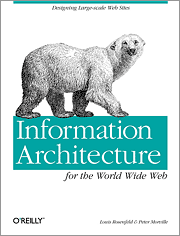
That confidence in their ideas led to, among other things, writing Information Architecture for the World Wide Web, considered one of the definitive texts in the then-nascent craft of making information easier to find online.
The Internet boom and bust
Lou became CEO and Peter was president of a growing, successful Argus. They took on new employees, improved their methodology, landed big clients like IBM and Microsoft, rented bigger offices and expanded the vision to include hosting industry conferences.
I became marketing manager for Argus in August 2000. I came in as part of the last big wave of new hires before the economic tide turned. I was part of the first wave of layoffs in January 2001, and the company folded in April 2001.
“The pain wasn’t so much for me personally but for what people were going through and that the ideas we had weren’t going to come to fruition,” Lou said. He felt confident he’d land on his feet but hated letting down his employees.
If there was a silver lining, it was that Lou had already been feeling too distanced from the work he enjoyed most — he didn’t like being administrator of a big company, he wanted to roll up his sleeves and actually do the work.
“I was relieved to start over.”
In one fell swoop, Lou made the decision to close Argus and propose to his long-time girlfriend, Mary Jean Babic. He’d just had minor surgery and admits he was heavily medicated when he came to both decisions. He laughs when he says he wishes he’d gotten doped up sooner — it gave him the clarity to see where his life was headed and to act without fear.
Lou said he never worried about his future. He figured he’d do some consulting and land on his feet. But his confidence as an entrepreneur was a little shaken.
“It took me a few years to get over my fear of, ‘Can I do this again?'”
The next chapter: Rosenfeld Media
Six years after Argus folded, Lou and Mary Jean and their little girl, Iris, moved to New York. I’m honored when he says our relocation here inspired them.
“We just asked ourselves, ‘Is this where we want to spend the next 20 or so years while our kids grow up?'” They loved Ann Arbor, but Lou grew up in New York, has family here and Mary Jean’s brother is here, too.
“We weren’t ready to have things so nailed down for the rest of our lives.”
Changing hometowns helped open Lou up to changing how he earned his living. Maybe it was moving to a city with a thriving user experience community, maybe it was living in a publishing hub, but Lou found himself wanting to publish books to help people like him do their jobs.
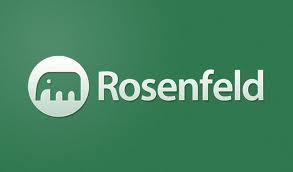
He’d founded Rosenfeld Media in 2005, and kicked it up a notch after the move.
He had pitched the idea of a new imprint with him as editor to a couple of traditional publishers and got good feedback. But he saw the constraints that working with a traditional publishing model would impose, and decided to start a new business again. Plus he knew that his network was even more important to publishing than what traditional publishers might offer.

“I wanted my next business to be about who I know, not what I know,” Lou said. “Your network can never be commoditized.”
“I need to leverage my network,” he said. The man has been traveling the world doing consulting and giving talks for years. His Rolodex is fierce.
Lou drew on his knowledge of the Internet and disruptive technologies, too. He didn’t want to run his new venture under the old publishing business model of printing books to sell to a distributor, who would then service big bookstores like Borders and Barnes & Noble.
Instead he wanted to create a tighter relationship with his authors and his readers, selling directly as well as working with writers on best practices for promotions. For example, he’s looking at a partnership so his authors’ works can be converted into instructional videos.
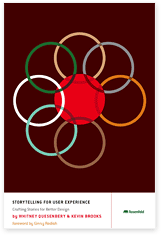
Rosenfeld Media is now publishing all of his books in three digital formats, as well as paperback. And among other ideas, Lou is developing a newsletter with content curated by experts.
“I have so many ideas. I can’t stop,” Lou said.
Lou and I took the Myers Briggs personality type test at Argus. We’re both ENFPs. I get what he’s saying. We’re prone to constant idea generation, swimming around in the infinite possibilities the world presents, and we have to consciously tune some of that out in order to execute on at least some of those possibilities.
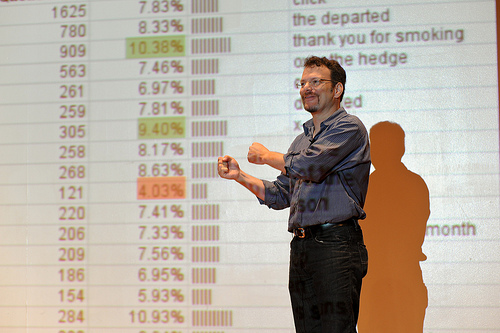
For now, Lou’s focusing on building Rosenfeld Media and on carefully selected speaking engagements, on topics that matter to him and at events where he’ll see people essential to his success. He also continues to consult with a limited set of corporate clients.
It’s all part of building his platform, the 21st century view of entrepreneurship. If he positions himself as a leader in user experience, then whether he and his authors publish books or speak at conferences, it’s all part of a self-referring network where everything builds the visibility of all the other parts of the business.
And these are the kinds of ideas Lou gets excited about while listening to Dylan.
More about Lou:

Lou Rosenfeld on redefining his career and emulating Bob Dylan

5 Comments
Eye Laser Surgery
i love bob dylan, he is one of the best singer songwriter “;*
Lory Bridjmohan
Hey there, You’ve done a great job. I will definitely digg it and individually suggest to my friends. I am sure they’ll be benefited from this website.
Leave a reply